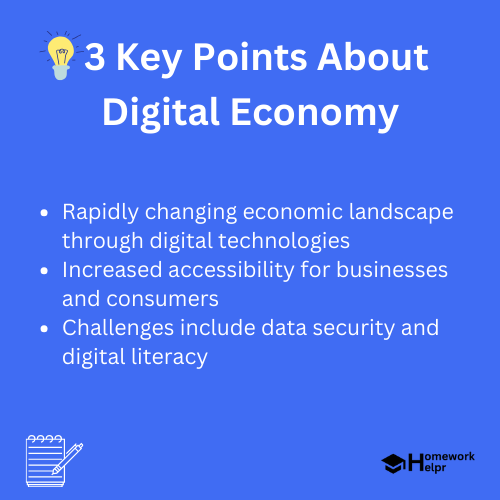📝 Summary
The digital economy is centered on economic activities made possible through digital technologies, primarily the internet. It includes diverse activities like e-commerce, digital marketing, and fintech. The digital economy enhances accessibility for businesses and consumers, resulting in broader reach and reduced operating costs. However, it poses challenges such as data privacy concerns and the need for greater digital literacy among individuals. The future seems bright with technologies like AI and the Internet of Things evolving, promising improved productivity and remote work opportunities. Embracing educational initiatives is vital for maximizing benefits while addressing challenges effectively.
Understanding the Digital Economy
The digital economy refers to an economy that is primarily based on digital technologies, especially the internet, as a means of facilitating economic activity. It encompasses a wide range of economic activities that utilize digital information and communication technologies (ICT). As technology continues to innovate and evolve, the digital economy is rapidly changing the way businesses operate, consumers shop, and the overall economic landscape. In this article, we will explore the concepts, components, benefits, challenges, and future of the digital economy.
What is the Digital Economy?
The digital economy can be defined as the economic activities that are enabled by the internet and other digital technologies. This includes anything from online shopping, digital payment systems, and e-commerce platforms to online advertising and social media. The digital realm allows for faster, more efficient transactions and creates opportunities for businesses to reach a global audience.
Key components of the digital economy include:
- E-commerce: Buying and selling goods and services over the internet.
- Digital marketing: Utilizing online platforms to promote products or services.
- Fintech: Financial technologies that facilitate online banking, investment, and money transfers.
- Big data: Analyzing large datasets to gain insights and inform business decisions.
Definition
E-commerce: The activity of buying or selling goods and services over the internet. Fintech: Technology that aims to improve and automate the delivery of financial services.
Example
For instance, platforms like Amazon and Alibaba are examples of e-commerce that enable consumers to shop online from anywhere in the world.
The Benefits of the Digital Economy
One of the most significant advantages of the digital economy is the increased accessibility it provides. Businesses can reach a wider audience without the geographical limitations of traditional brick-and-mortar stores. Moreover, consumers have greater choices and can shop anytime and anywhere, which leads to improved customer satisfaction.
Another benefit is the reduced operating costs for businesses. Digital platforms can be more affordable than physical locations, allowing entrepreneurs to start ventures with lower initial investments. The automation of processes enhances efficiency, allowing companies to focus on core competencies while minimizing administrative tasks.
💡Did You Know?
Did you know that the global digital economy is estimated to be worth around $4 trillion and is expected to grow even more in the coming years?
Challenges of the Digital Economy
Despite its many benefits, the digital economy also presents several challenges. One of the primary concerns is the issue of data privacy and security. With more transactions conducted online, there is an increased risk of data breaches, identity theft, and cyber-attacks. Businesses must prioritize safeguarding their customers’ information.
Additionally, there is the challenge of digital literacy. Not everyone is equipped with the skills required to thrive in a digital economy. Some individuals may lack access to technology or the internet altogether, widening the gap between different sectors of society. Thus, it is essential to invest in education and training to equip everyone with the necessary skills.
Definition
C yber-attacks: Attempts to damage, disrupt, or gain unauthorized access to computer systems, networks, or devices. Digital literacy: The ability to effectively and critically navigate, evaluate, and create information using digital technologies.
Example
For example, people in rural areas with limited internet access may struggle with online jobs or e-learning opportunities, leaving them at a disadvantage.
The Future of the Digital Economy
The future of the digital economy looks promising, with innovations continuing to reshape the landscape. Technologies such as artificial intelligence (AI), machine learning, and the Internet of Things (IoT) are already making significant impacts and will continue to evolve. These advancements are expected to transform industries by enhancing productivity, improving the customer experience, and enabling smarter decision-making.
Another trend is the growth of remote work, made possible by digital tools that allow teams to collaborate from different locations. As more companies embrace flexible work arrangements, digital platforms will play a crucial role in maintaining productivity and connectivity.
Conclusion
The digital economy is an integral part of our modern world, reshaping how we communicate, conduct business, and interact as consumers. Although it presents numerous advantages and possibilities, it also comes with its challenges, particularly in areas like data security and accessibility. As we move forward, it is essential to prioritize education, technological advancements, and policies that promote inclusivity in the digital realm. By embracing these changes and remaining adaptable, we can ensure a prosperous future in the digital economy.

Related Questions on Digital Economy
What is the digital economy?
Answer: The digital economy consists of economic activities enabled by digital technologies, particularly the internet, impacting how businesses operate and consumers shop.
What are some key components of the digital economy?
Answer: Key components include e-commerce, digital marketing, fintech, and big data, all contributing to enhanced economic activity online.
What challenges does the digital economy face?
Answer: Challenges include data privacy concerns, cybersecurity risks, and the need for digital literacy to ensure equitable access to digital resources.
How is technology shaping the future of the digital economy?
Answer: Technologies such as AI, machine learning, and IoT are expected to reshape industries by enhancing productivity, improving customer experiences, and facilitating remote work.
